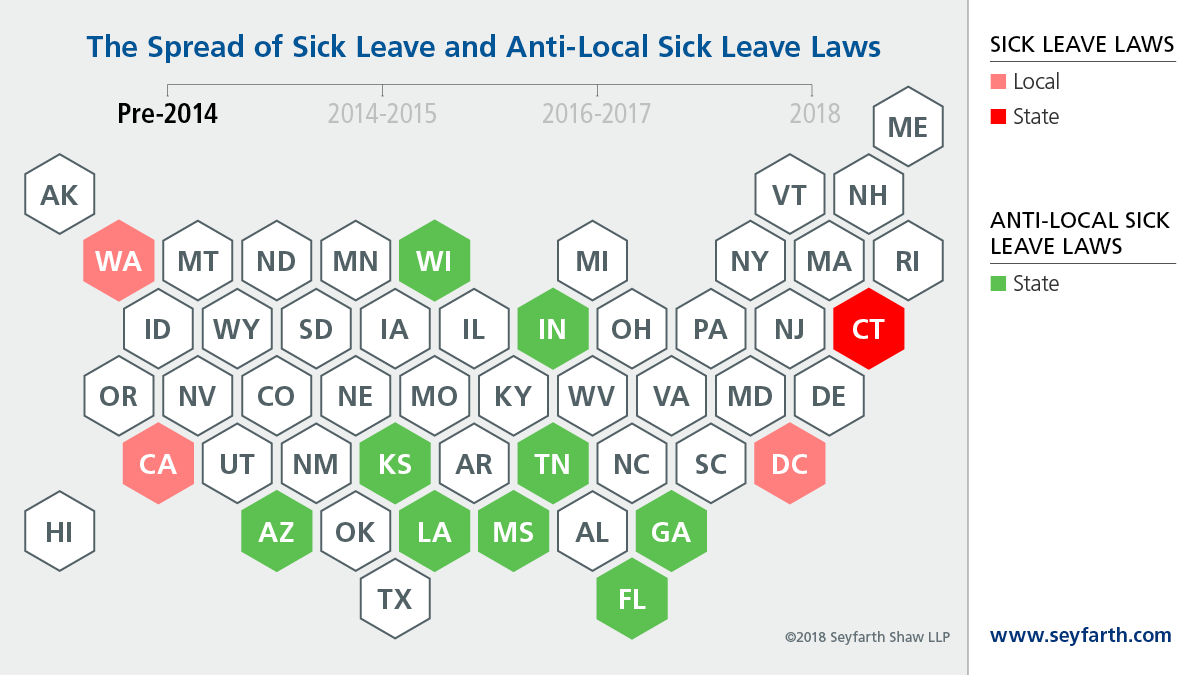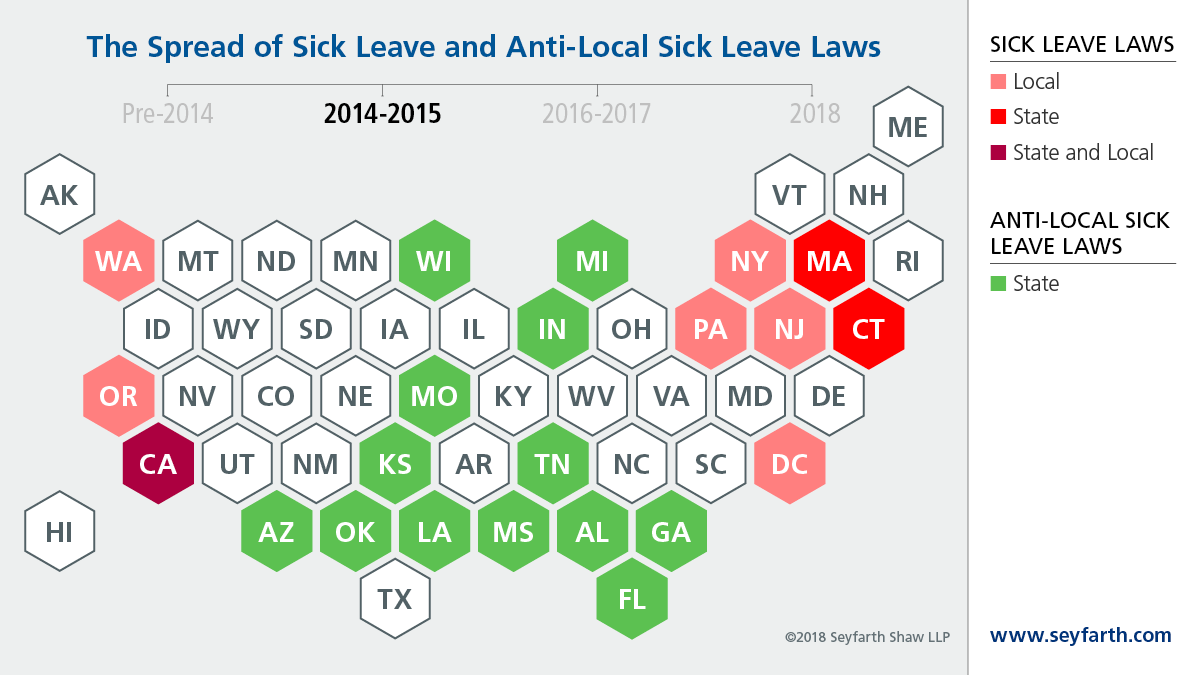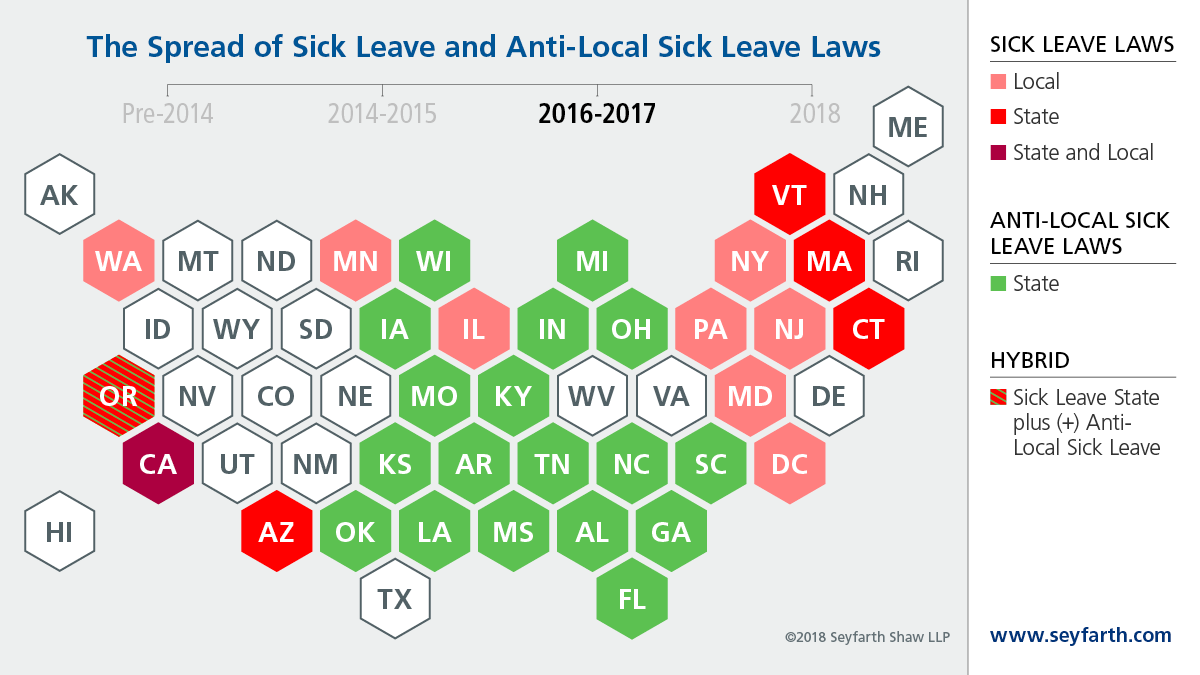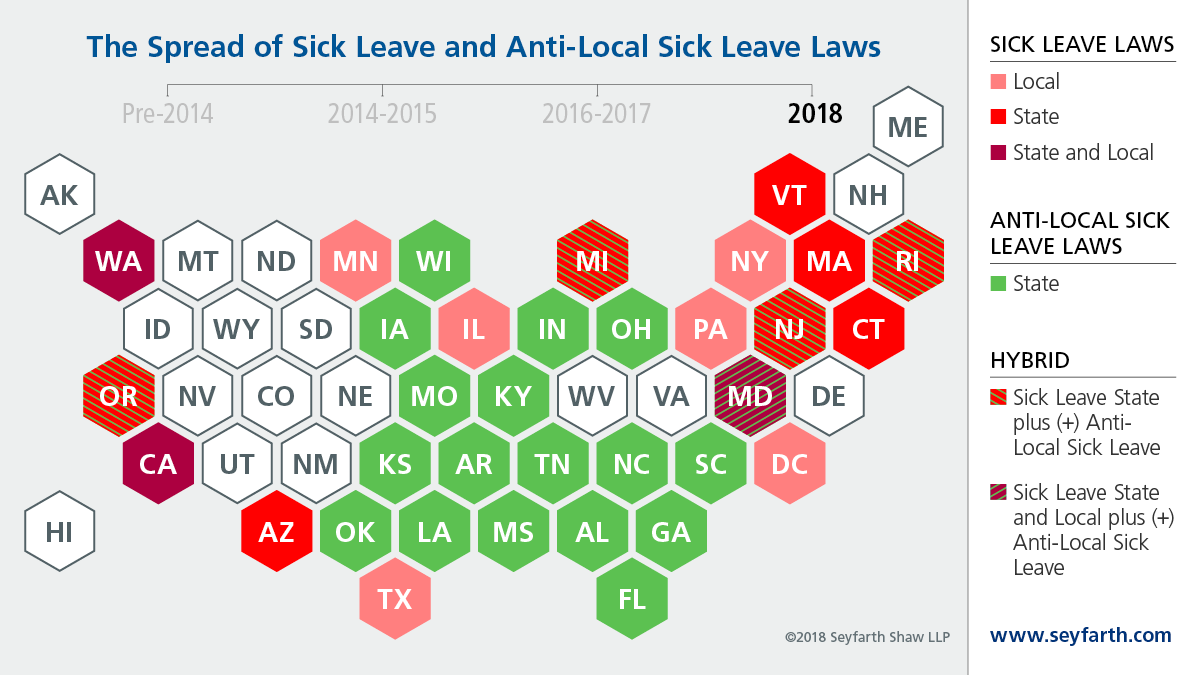Over the last decade, dozens of states and cities have infected the nation with a patchwork of paid sick leave laws and ordinances. The paid sick leave epidemic has created compliance challenges for countless employers, whether their operations are nationwide, multi-state, or limited to a single state. As the paid sick leave epidemic has grown, so too has the number of states immunizing their boundaries from local paid sick leave ordinances.
The current spread of paid sick leave and anti-local sick leave laws takes several forms. In some states, only local paid sick leave ordinances exist. In others, there are only state paid sick leave laws in place. Some statewide paid sick leave laws strip localities of the ability to regulate paid sick leave. Other statewide sick leave laws have declined to enforce the anti-local vaccine, thereby allowing state and local paid sick leave mandates to co-exist. Finally, some states have enacted anti-local sick leave legislation without any statewide paid sick leave mandate in place.
The presence of a local paid sick leave ordinance or anti-local paid sick leave law does not prevent a state from passing a paid sick leave law in the future. Additionally, regardless of the presence or absence of paid sick leave mandates or anti-local paid sick leave laws, new strands of the paid sick leave virus, as well as new vaccines, have emerged over the years due to legislative and executive shifts across the nation. Needless to say, the paid sick leave landscape is constantly evolving. These maps illustrate the spread of the paid sick leave epidemic and anti-local paid sick leave vaccine over the years.
Read on for specific points about the development of paid sick leave laws during each of the four relevant time periods.
Pre-2014

Note 1: Local paid sick leave mandates present in: (1) San Francisco, CA; (2) Long Beach, CA (covers certain hotel employers only); (3) Seattle, WA; and (4) Washington, D.C. Outside of these locations, and the state of Connecticut, paid sick leave was an area left to employer discretion.
Note 2: A majority of the nine state anti-local paid sick leave laws in effect prior to 2014 preempted localities from regulating a wide range of employment-related matters, such “employment benefits” or a related term (which generally includes time off benefits and leave), as opposed to expressly preempting localities from regulating sick leave.
Note 3: A paid sick leave ordinance was enacted in Milwaukee, WI in 2008. However, due to judicial and legislative delays, the ordinance had not yet gone into effect when Wisconsin passed its statewide anti-local paid sick leave law in 2011.
2014-2015

Note 1: In a matter of two years, the number of state and local paid sick leave laws around the country that were in effect or scheduled to go into effect increased from five to 23. The sick leave epidemic particularly impacted jurisdictions in the Northeast and Mid-Atlantic, and on the West Coast. To combat the epidemic, state anti-local paid sick leave laws emerged in four additional states.
Note 2: Local paid sick leave mandates present in: (1) San Francisco, CA; (2) Long Beach, CA (covers certain hotel employers only); (3) Oakland, CA; (4) Emeryville, CA; (5) Los Angeles, CA (covers certain hotel employers only); (6) Portland, OR; (7) Philadelphia, PA; (8) Jersey City, NJ; (9) Newark, NJ; (10) Passaic, NJ; (11) East Orange, NJ; (12) Paterson, NJ; (13) Irvington, NJ; (14) Montclair, NJ; (15) Trenton, NJ; (16) Bloomfield, NJ; (17) New York City, NY; (18) Seattle, WA; (19) SeaTac, WA (covers certain transportation and hospitality employers only); and (20) Washington, D.C.
Note 3: When California’s statewide paid sick leave law went into effect, it became the first state in which both state and local paid sick leave mandates were imposed.
Note 4: During this time period, New Jersey municipalities added nine local paid sick leave mandates and became home to the greatest number of municipal sick leave ordinances of any state in country. New Jersey would retain this title until October 29, 2018.
Note 5: Pittsburgh, PA also passed a paid sick leave ordinance during this timeframe. It was scheduled to go into effect in early January 2016. However, it has not taken effect due to ongoing litigation regarding whether Pittsburgh could pass such an ordinance. The Pennsylvania Supreme Court heard oral arguments on the matter in October 2018.
2016-2017

Note 1: During this 2016-17 window, the paid sick leave epidemic nearly doubled, increasing the number of laws with state or local mandates either in effect or scheduled to go into effect from 23 to 40. Notably, not only did the epidemic continue to intensify in the Northeast, Mid-Atlantic, and on the West Coast, but it also began spreading inward to Arizona and localities in Illinois and Minnesota. To combat the epidemic, state anti-local paid sick leave laws emerged in 7 additional states.
Note 2: Local paid sick leave mandates present in: (1) San Francisco, CA; (2) Long Beach, CA (covers certain hotel employers only); (3) Oakland, CA; (4) Emeryville, CA; (5) Los Angeles, CA (two ordinances – one covers certain hotel employers only and the other generally applies to private employers); (6) San Diego, CA; (7) Santa Monica, CA; (8) Berkeley, CA; (9) Chicago, IL; (10) Cook County, IL; (11) Montgomery County, MD; (12) Minneapolis, MN; (13) Saint Paul, MN; (14) Philadelphia, PA; (15) Jersey City, NJ; (16) Newark, NJ; (17) Passaic, NJ; (18) East Orange, NJ; (19) Paterson, NJ; (20) Irvington, NJ; (21) Montclair, NJ; (22) Trenton, NJ; (23) Bloomfield, NJ; (24) New Brunswick, NJ; (25) Elizabeth, NJ; (26) Plainfield, NJ; (27) Morristown, NJ; (28) New York City, NY; (29) Seattle, WA; (30) SeaTac, WA (covers certain transportation and hospitality employers only); (31) Spokane, WA; (32) Tacoma, WA; and (33) Washington, D.C.
Note 3: Oregon’s statewide paid sick leave law came with an anti-local preemption vaccine, which eliminated the local strain that was in effect in Portland and had been enacted in Eugene.
Note 4: In 2013, the Arizona legislature enacted a preemption law, preempting a wide range of employment matters, including paid sick leave. The 2017 Arizona statewide paid sick leave law, however, expressly permits localities to enact more generous local paid sick leave mandates. See Ariz. Rev. Stat. §§ 23-378, 23-379(b). Given this language and questions surrounding the propriety of the preemption law in a more general context, it is very likely that localities may attempt to regulate paid sick leave in Arizona. See generally United Food & Com. Workers Local 99 v. State, No. CV 2016-092409, 2017 WL 8776461 (Ariz. Super. Ct. Aug. 30, 2017).
Note 5: The North Carolina law prohibiting local regulation of private employment practices (which likely includes sick leave) is set to expire on January 1, 2020.
Note 6: Ohio’s paid sick leave preemption statute (Ohio Rev. Code Ann. § 4113.85) was enacted in 2016 via S.B. 331, a bill regulating a broad range of topics beyond preemption or employment law, and went into effect in March 2017. Many municipalities have filed lawsuits due to S.B. 331’s broad sweep. At least two county courts in Ohio have found that the bill violates the Ohio Constitution’s “one subject” clause and declared all provisions of S.B. 331 unrelated to pet store purchase supply regulation, the bill’s original purpose, unconstitutional. Regardless, localities in Ohio are likely preempted from passing paid sick leave legislation because (1) Ohio Rev. Code Ann. § 4113.85 is in effect, (2) at least one intermediate appellate court case found that because the plaintiffs did not challenge paid sick leave preemption, but rather another provision, the issue of paid sick leave preemption was moot, and (3) the county court decisions do not bind other courts.
Note 7: On January 1, 2017, the federal contractor paid sick leave requirements, as set forth in Executive Order 13706 and the United States Department of Labor’s corresponding Final Rule, went into effect, thereby providing paid sick leave benefits to many employees of certain federal contractors.
2018-2019

Note 1: 2018 has seen the paid sick leave epidemic spread to only three additional localities. However, the epidemic has continued to evolve and expand as five additional statewide sick leave mandates either went into effect or were enacted this year. The total number of paid sick leave mandates in effect or scheduled to go into effect at the time of this publication is 35 (this figure excludes Pittsburgh, PA and Austin, TX in light of ongoing lawsuits challenging the cities’ respective paid sick leave ordinances).
Note 2: Local paid sick leave mandates either in effect or scheduled to go into effect in: (1) San Francisco, CA; (2) Long Beach, CA (covers certain hotel employers only); (3) Oakland, CA; (4) Emeryville, CA; (5) Los Angeles, CA (two ordinances – one covers certain hotel employers only and the other generally applies to private employers); (6) San Diego, CA; (7) Santa Monica, CA; (8) Berkeley, CA; (9) Chicago, IL; (10) Cook County, IL; (11) Montgomery County, MD; (12) Minneapolis, MN; (13) Saint Paul, MN; (14) Duluth, MN; (15) New York City, NY; (16) Westchester County, NY; (17) Philadelphia, PA; (18) San Antonio, TX; (19) Seattle, WA; (20) SeaTac, WA (covers certain transportation and hospitality employers only); (21) Tacoma, WA; and (22) Washington, D.C.
Note 3: March 30, 2019 is the expected effective date of the Westchester County, NY ordinance because this date is 180 days from the date the paid sick leave bill was “adopted” according to the language of the ordinance and corresponding certification page from the Clerk of the Westchester County Board of Legislatures. However, there are multiple interpretations of the effective date that could result in a slightly different effective date as we near late-March/early-April 2019.
Note 4: The Duluth, MN paid sick leave ordinance is scheduled to go into effect on January 1, 2020.
Note 5: The Texas update is based on the following: The cities of Austin and San Antonio both passed paid sick leave ordinances in 2018. The Austin ordinance was originally scheduled to go into effect on October 1, 2018, while the San Antonio ordinance is scheduled to go into effect for most employers on August 1, 2019. The Austin ordinance is currently involved in a lawsuit that found the ordinance to be unconstitutional. In addition, the Texas legislature has introduced a bill that would prohibit all municipal paid sick leave ordinances in the state. However, the lawsuit does not impact San Antonio and the preemption bill will not be passed, if at all, until 2019. As a result, at the time of this publication, at least San Antonio’s paid sick leave ordinance is still “scheduled to go into effect” in August 2019.
Note 6: Like the California statewide paid sick leave law, the Washington statewide paid sick leave law, which went into effect on January 1, 2018, does not preempt municipalities within the state from passing more generous paid sick leave mandates.
Note 7: The Spokane, WA paid sick leave ordinance’s “sunset” provision took effect on January 1, 2018, and thus the Spokane ordinance is no longer in effect.
Note 8: Maryland’s statewide paid sick leave law preempted its political subdivisions from passing paid sick leave ordinances on or after January 1, 2017. As a result, Montgomery County’s paid sick leave ordinance, which went into effect in 2016, is still in effect and co-exists with the statewide paid sick leave law.
Note 9: When New Jersey’s statewide paid sick leave mandate went into effect on October 29, 2018, the law preempted the state’s 13 existing local paid sick leave ordinances and all future local New Jersey paid sick leave ordinances from being enacted.
Note 10: Michigan’s statewide paid sick leave law is scheduled to go into effect in late-March 2019. Michigan is currently the only state that (1) has a statewide paid sick leave mandate, and (2) preempts local paid sick leave ordinances via a law other than the statewide paid sick leave mandate. Michigan had prohibited local paid sick leave mandates since 2015, and thereafter passed its statewide paid sick leave law in 2018.
If you have any questions regarding these issues, please contact the authors, your Seyfarth attorney, or any member of Seyfarth Shaw’s Absence Management and Accommodations or Workplace Policies and Handbooks Teams.
